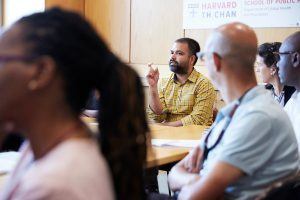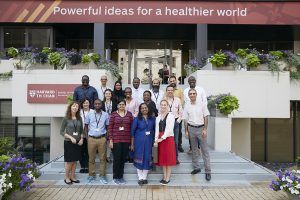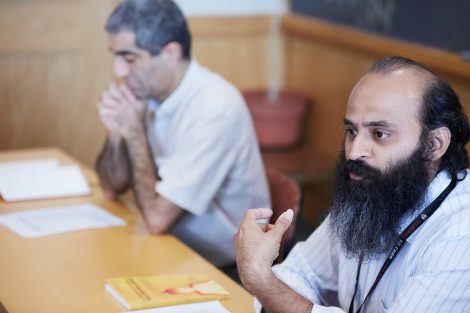August 9, 2019 – Chronic diseases are on the rise in India. About a quarter of adults have hypertension, and many are forced to pay high out-of-pocket costs for care. Healthy lifestyle training rooted in ancient yogic traditions could help provide relief, according to Sundeep Kapila, an alternative medicine practitioner, healthcare entrepreneur, and 2019 Bernard Lown Scholar in Cardiovascular Health at Harvard T.H. Chan School of Public Health.
During the Lown program’s on-campus session in July, Kapila developed a proposal for a randomized controlled trial to test the efficacy of yog—an older and more in-depth set of practices than Westernized yoga—for managing hypertension. If funded, it would enroll low-income adults in Mumbai who have hypertension in a course focused on yogic physical activity, dietary, and mindfulness practices, and life coaching. But first, Kapila had to get past a tough group of evaluators—his fellow Lown Scholars, who finish up the summer program with a weeklong series of rigorous but collegial feedback sessions intended to improve each other’s proposals.

Launched in 2008, the Lown program brings together mid-career public health scientists and professionals from low- and middle-income countries to take short courses together on topics related to cardiovascular disease prevention, and work with faculty mentors to develop project proposals. Scholars have the choice to work on scientific research topics—such as the social determinants of cardiovascular disease in Turkey—or, like Kapila, to develop low-cost and scalable solutions for improving health in underserved populations.
This year, the program hosted 14 scholars from countries including Barbados, Tanzania, and Nepal. They were joined by two scholars from previous years who received seed funding for their proposals and were invited back to discuss their progress and mentor the new cohort.

“The Lown Summer Program is a unique learning experience for Lown Scholars and their faculty mentors. The group this year included public health scientists with decades of experience in running nationwide surveys along with public health practitioners with extensive experience in working directly with communities. This diversity of life experiences leads to rich dialogues about major public health issues in each community and country, and innovative solutions to resolve them,” said Goodarz Danaei, Bernard Lown Associate Professor of Global Health and the Faculty Director of the program.
The Lown program is named in honor of Bernard Lown, a renowned cardiologist and professor emeritus at Harvard Chan School who received a Nobel Peace Prize as the co-founder of International Physicians for the Prevention of Nuclear War (IPPNW). Lown, now 98, remains actively involved in the program, meeting in his home with all scholars.
Photos: Kent Dayton
Learn more
Healing Patients and Healing the World (Harvard Public Health magazine)
